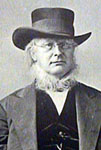Republican Philadelphia
The Origins of the Republican Party
Trying times spawn new forces. The Missouri Compromise of 1820 divided the country at the

Salmon Chase
The gavel fell to open the party's first nominating convention, in Philadelphia, Pennsylvania, on June 17, 1856, announcing the birth of the Republican Party as a unified political force.

Horace Greeley
The elections of 1854 saw the Republicans take Michigan and make advances in many states, but this election was dominated by the emergence of the short-lived American (or 'Know-Nothing') Party. By 1855, the Republican Party controlled a majority in the House of Representatives. The new party decided to hold an organizing convention in Pittsburgh in early 1856, leading up to the Philadelphia convention.
As the convention approached, things came to a head — and to blows. On the floor of the Senate, Democratic representatives Preston Brooks and Lawrence Keitt (South Carolina) brutally attacked Charles Sumner with a cane after Sumner gave a passionate anti-slavery speech which Brooks took offense (he was related to the main antagonist of Sumner's speech, South Carolina Senator Andrew Butler). Both representatives resigned from Congress with severe indignation over their ouster, but were returned to Congress by South Carolina voters in the next year. Sumner was not able to return to the Congressional halls for four years after the attack. Brooks was heard boasting "Next time I will have to kill him," as he left the Senate floor after the attack.
On the same day as the attack came the news of the armed attack in Lawrence, Kansas. As a direct outgrowth of the "settler sovereignty" of the Kansas-Nebraska Act, an armed band of men from Missouri and Nebraska sacked the town of Lawrence and arrested the leaders of the free state. The anti-abolitionists had made it clear that "settler sovereignty" meant pro-slavery. Labeled only as "ruffians" by Southern politicians, Horace Greeley was quick to decry both events as plots of the pro-slavery South. "Failing to silence the North by threats. . .the South now resorts to actual violence." The first rumblings of the Civil War had begun. The stage was set for the 1856 election, one which held the future of the Union in its grasp.
Read the Republican Platform of 1856
And what of the nickname "Grand Old Party"?
The nickname of the Republican Party didn't get attached to it until 1888. Previously, the nickname had been used by Southern Democrats. After the Republicans won back the Presidency and Congress for the first time since the Grant administration, the Chicago Tribune proclaimed: "Let us be thankful that under the rule of the Grand Old Party ... these United States will resume the onward and upward march which the election of Grover Cleveland in 1884 partially arrested."



